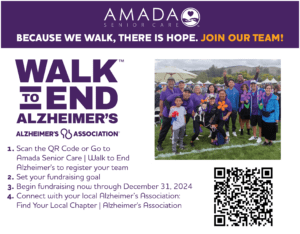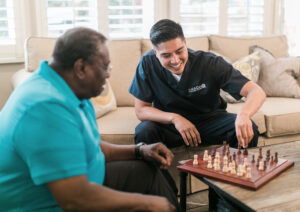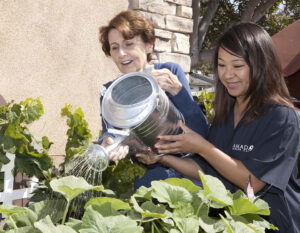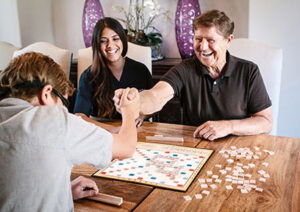
September 21st marks World Alzheimer’s Day, a day dedicated to raising awareness about Alzheimer’s disease and dementia. Since 2012, this effort has expanded to World Alzheimer’s Month, a full month of advocacy and education. Alzheimer’s is a complex and often misunderstood disease, and this month is an opportunity to challenge the stigmas surrounding dementia and promote understanding.
In the United States alone, the Alzheimer’s Association estimates that 6.5 million people are living with Alzheimer’s—a number expected to rise as the Baby Boomer generation ages. By 2050, that figure could soar to 12.7 million.
Alzheimer’s is currently the seventh leading cause of death in the U.S. and the most common form of dementia. World Alzheimer’s Month calls on each of us to take action: educate ourselves on prevention, learn to recognize symptoms, and support those diagnosed with this devastating disease.
Caring for a Senior with Dementia or Alzheimer’s
Providing quality care for someone with Alzheimer’s requires a combination of understanding, patience, specialized training, and certification, according to Dell Gray, co-owner of Amada Orlando, who with his wife and co-owner, Veronica, served as a family caregiver to his mother-in-law as she went through the stages of Alzheimer’s disease.
“Caregivers need to understand the progression of the disease—from early to late stages—and know how to adapt their care accordingly,” says Dell.
Assessing Unique Care Needs for a Senior with Alzheimer’s
Caring for a loved one with Alzheimer’s can be challenging, and every senior’s needs are different. Christy Babcock, co-owner of Amada Senior Care Los Angeles and Pasadena with her husband Patrick, shared a story about a longtime client with advanced Alzheimer’s. When her regular caregiver had to leave, the woman reacted to new caregivers with distress, clinging to her husband for comfort.
That’s when their care coordinator Fabiola visited the couple and discovered a key detail—the client had a deep connection to music. Fabiola began singing, and the woman’s demeanor changed entirely.
“From that moment, we knew music was the key to her allowing us to care for her,” Christy said. “It’s crucial to understand a senior’s history, even if they can’t communicate it anymore. Speaking with family and exploring their past helps caregivers build a bond beyond daily care tasks.”
Navigating the Challenges of Dementia
“It’s very important to remember that dementia doesn’t affect the same two people the same,” says Dwight Smith, owner of Amada Toledo and Amada Columbus who earned accreditation with the National Council of Certified Dementia Practitioners. “As a caretaker, it’s critical to be patient, understanding that their world has changed and to accept that.”
His experiences in caring for his father as he went through the stages of dementia put Dwight on the path of becoming an Amada franchise owner. Being an Alzheimer’s family caregiver inspired Dwight to put himself in a vocation where he could provide quality care, resource, and peace of mind to families caring for a senior loved one with dementia.
“From personal experience, the most important thing a caretaker can do is to take personal time for themselves to build back their energy, sort through their emotions and feelings and be the healthiest version of themselves they can be for their loved one,” says Dwight. “Patience is truly a virtue when caring for someone with dementia and it is critical to ‘go to their world’ when interacting with them daily.”
“I highly recommend the Alzheimer’s Association for more resources and information on how to best navigate the challenges caretakers face daily when caring for a loved one with Alzheimer’s or another form of dementia,” he adds.
Recognizing Alzheimer’s Early Warning Signs
Early detection of Alzheimer’s can make a significant difference, allowing for treatments that may slow the disease’s progression and alleviate some symptoms. While there is no cure for Alzheimer’s yet, ongoing research offers hope, with new drugs in clinical trials that aim to not only prevent the disease but potentially reverse its symptoms.
The Alzheimer’s Association has identified the following 10 early warning signs of Alzheimer’s or other form of dementia:
- Memory loss that disrupts daily life
- Difficulty planning or solving problems
- Struggles with familiar tasks at home, work, or leisure
- Confusion with time or place
- Trouble understanding visual images and spatial relationships
- New challenges with speaking or writing
- Misplacing items and struggling to retrace steps
- Poor judgment or decision-making
- Withdrawal from work or social activities
- Changes in mood or personality
If you or a loved one exhibits any of these symptoms, it’s important to seek advice from medical professionals and senior care advisors. Early diagnosis can help families plan for the future and access support services. Reach out to an Amada Senior Care advisor to learn more about how our specially trained caregivers can enhance the quality of life for those with Alzheimer’s or dementia.
Supporting Alzheimer’s Research and Care
Alzheimer’s disease comes with significant emotional and financial costs. One way to support the fight against Alzheimer’s is by participating in fundraising efforts. At Amada Senior Care, we are proud to be a national sponsor of the Alzheimer’s Association. Several Amada franchise offices around the country have formed teams to participate in this fall’s Walk to End Alzheimer’s that takes place in over 600 U.S. communities from now through November. CLICK HERE to find an Amada office with a Walk to End Alzheimer’s team that you can join or donate to.
Becoming an Advocate for Alzheimer’s Awareness
Alzheimer’s is one of the world’s most pressing health issues, requiring greater attention, research funding, and stronger public policies. If you want to make a difference, consider becoming an advocate. The Alzheimer’s Association offers resources to help you get involved and push for increased funding and research into dementia and Alzheimer’s. By joining the global effort this World Alzheimer’s Month, you’re helping to increase understanding, support families, and bring us closer to breakthroughs in care and treatment to #ENDALZ.















